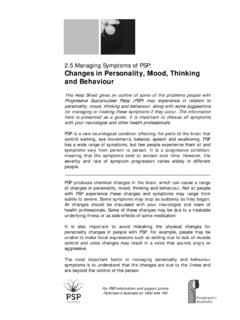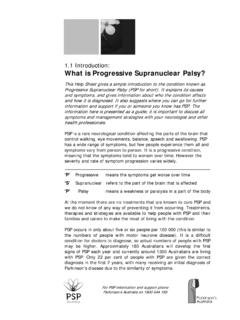Transcription of 4.1 Managing Symptoms later in life - PSP Australia
1 : later in life Issues Managing Symptoms of PSP later in life This Help Sheet outlines the main Symptoms experienced by people with progressive supranuclear palsy (PSP) in the later stages of the condition as they are nearing the end of life . It suggests strategies, treatments and therapies for Managing these Symptoms and ensuring the best possible quality of life . The information here is presented as a guide; it is important to discuss all Symptoms with your neurologist and other health professionals. PSP is a rare neurological condition affecting the parts of the brain that control walking, eye movements, balance, speech and swallowing. PSP has a wide range of Symptoms , but few people experience them all and Symptoms vary from person to person.
2 It is a progressive condition, meaning that the Symptoms tend to worsen over time. However, the severity and rate of symptom progression varies widely. The Symptoms of PSP become more challenging as the condition progresses. Management of Symptoms becomes even more important in the later stages, when survival and quality of life are dependant on good symptom control. Managing problems with swallowing and eating later in life Some people with PSP may experience severe problems with swallowing and this can cause two main problems: They may no longer be able to swallow enough food and drink to get the nutrition and hydration they need. They may become at risk of chest infection or pneumonia due to repeated aspiration (breathing into the airways) of food or fluid and the inability to clear the chest due to a weak cough.
3 A speech pathologist can help to develop strategies and dietary modifications to make swallowing safe and to maintain nutrition and For PSP information and support phone Parkinson s Australia on 1800 644 189 hydration for as long as possible. They may also work with a dietician to optimise the calories that are available in the food to help maintain weight. A strategy that may be considered is for the person to receive supplementary hydration and feed through a tube called a Percutaneous Endoscopic Gastrostomy (PEG) placed directly into the stomach. This involves having an operation under light anaesthetic. This procedure tends to work best for people who opt to have a PEG inserted before the need has become a medical emergency.
4 In many cases a PEG supplements, rather than replaces, eating and drinking. It provides a top-up, so that the pleasures of eating and drinking can still be enjoyed without the pressure of ensuring sufficient nutrition and hydration. There are a number of issues to consider in choosing this procedure. The advantages of PEG feeding include: It is no longer a struggle to get enough food and fluid intake. Quality of life may improve with adequate nutrition and hydration. There is less risk of aspiration from breathing food into the airways. Weight loss can be addressed. Medications can be given via the PEG tube. The disadvantages of PEG feeding include: The operation to insert the PEG tube may require a couple of days in hospital.
5 There is a risk of infection internally and where the tube is inserted. The person s carer/s will need to be willing and able to learn to use the equipment, which may take some practice. Unfortunately the PEG does not resolve difficulties associated with swallowing saliva, such as coughing, thickening of saliva secretions and aspiration (saliva or secretions entering the lungs causing infection). For more information about Managing these difficulties, please refer to PSP Australia s Help Sheet: Swallowing, eating difficulties and saliva control. It is important to remember that a PEG tube does not stop the progression of PSP. When considering the option of PEG feeding, the Page 2 most important considerations are the wishes of the person with PSP.
6 It is important to discuss such matters in the early stages of the condition before they become an issue and before the onset of serious communication problems. For some people, particularly those with serious Symptoms at an advanced stage, PEG feeding may do little more than prolong suffering. Your neurologist and health care providers can give further advice. However, the decision should be made by the person with the condition. Managing problems with speech and communication later in life Difficulties with speech can progress to the point where it is no longer possible for people with PSP to communicate effectively with words. This can be very frustrating for everyone concerned.
7 It is important to remember that most people with PSP remain mentally aware; they can understand what is going on around them even when they may no longer be able to respond. A range of aids and strategies are available to help with communication. It is useful to introduce these aids and strategies before they are needed, so that both carers and the person with PSP become familiar and practiced at using them. The following are some of the aids and strategies that people living with PSP have found useful. However, you should consult your speech pathologist for individual advice. Note also that some of the equipment below is expensive, although subsidies may be available for some.
8 Voice amplifiers may be useful if the person still has relatively good speech but with low volume. The amplifier acts like a small portable microphone. Alphabet boards require some movement ability for the person to indicate letters of the alphabet. Often the first few letters of words are all that is needed to communicate simple messages. Sometimes symbols (eg a picture of a toilet) are added to indicate what is needed. Careful placement is needed, taking account of the limited eye movements of the person with PSP. Electronic devices can assist even where movement is severely limited. Such aids can be programmed to give a response in the form of a recorded message at the touch of a button.
9 A variety of devices are available with varying complexity and cost. Help Sheet later in life Issues Managing Symptoms later in life Page 3 Hand-squeeze and other techniques can be developed by people with PSP and carers working together to develop a system that suits them. In its simplest form the carer goes through the letters of the alphabet and the person with PSP squeezes his/her hand at the right letter. A more sophisticated version can be used, where a double squeeze takes you into code where one squeeze in each letter of the alphabet has a meaning such as: I am hungry , I am tired , Shut up or other simple phrases that may be helpful. A speech pathologist can advise on communication techniques or devices to suite individual needs and circumstances.
10 Managing bowel and bladder problems later in life A variety of continence aids are available to assist in Managing bladder and bowel problems in the later stages of PSP. Pads, condom drainage and absorbent sheets (Kylie Sheets) can assist in promoting comfort when it is difficult to get to the toilet. If the bladder is affected, consideration may be given to having a permanent catheter. As many people with advanced PSP are also affected by constipation, a regular aperient often becomes necessary. Many people have regular suppositories or small enemas, which stimulate the lower colon and rectum and to help pass the stool. Use of these types of aperients has the advantage of a fast response and bowel actions occurring at a predictable time.

